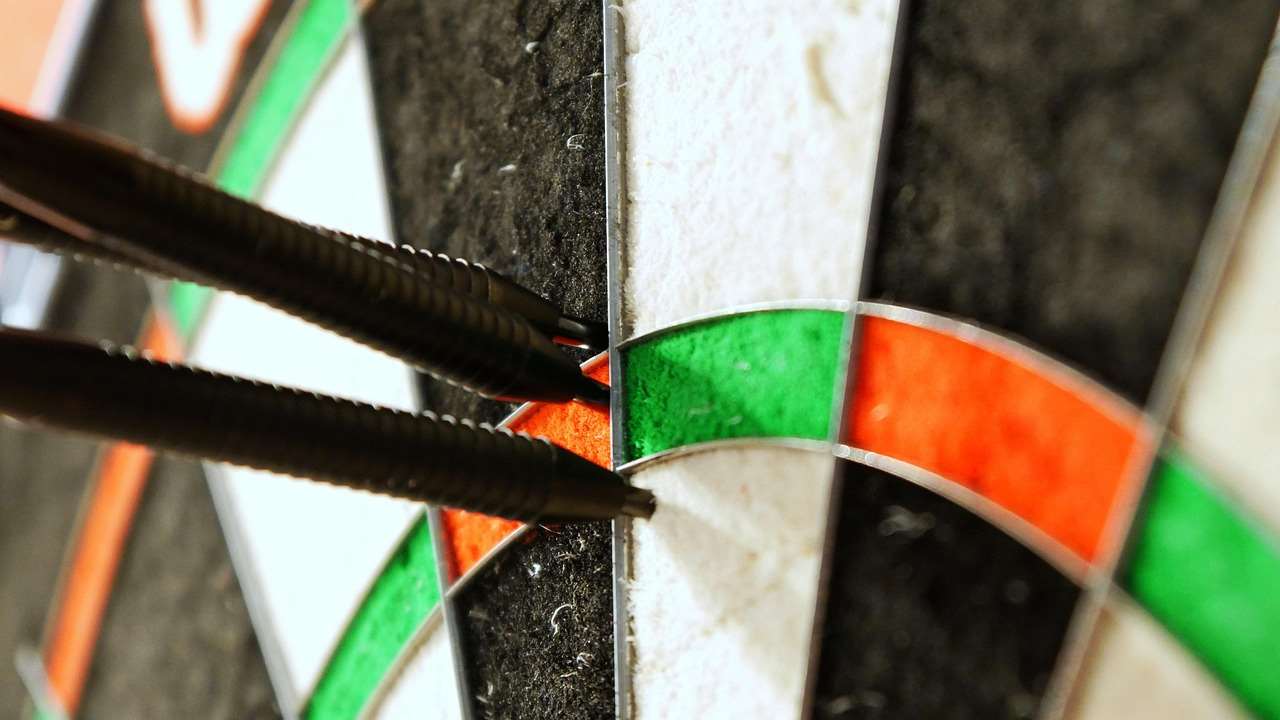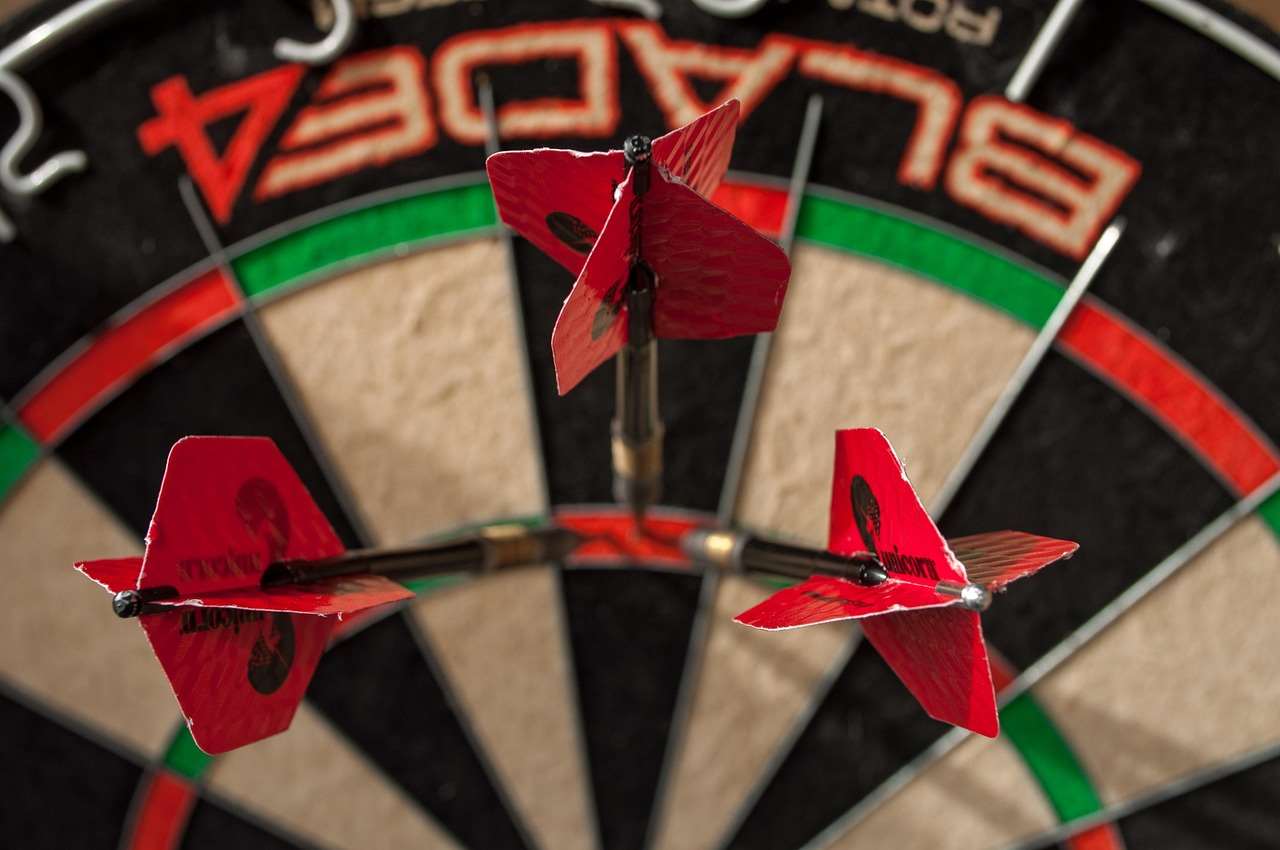Mastering the rules of darts is only half the battle; understanding **dart game rules etiquette tips** is what truly elevates your game and ensures enjoyable matches for everyone involved. This article will guide you through essential dart etiquette, covering everything from respectful conduct to maintaining a fair and fun playing environment.
⚠️ Still Using Pen & Paper (or a Chalkboard)?! ⚠️
Step into the future! The Dart Counter App handles all the scoring, suggests checkouts, and tracks your stats automatically. It's easier than you think!
Try the Smart Dart Counter App FREE!Ready for an upgrade? Click above!
Understanding Dart Etiquette: More Than Just the Rules
While knowing the official **dart game rules** is crucial, proper etiquette is the unspoken code that fosters a positive and respectful environment. Think of it as the invisible framework that supports the game’s integrity and enjoyment. Good sportsmanship, consideration for your opponents, and an understanding of common courtesies are all fundamental aspects of dart etiquette. Ignoring these unspoken rules can lead to friction, unpleasant experiences, and even damage your reputation within the dart-playing community.
Etiquette covers many areas, from appropriate behaviour during gameplay to maintaining a safe and respectful environment. Consider the impact of your actions on others, and strive to create a friendly atmosphere where everyone can enjoy the game. Remember, darts is often a social activity, and the quality of those interactions can greatly influence the overall experience.

Essential Dart Etiquette Tips for Players
Here’s a breakdown of key **dart game rules etiquette tips** that every player should know:
- Avoid Distractions: Refrain from talking, moving, or making noise while your opponent is throwing their darts. This is perhaps the most fundamental rule of dart etiquette.
- Respect the Throwing Line (Oche): Do not cross the throwing line when retrieving your darts. Maintain a respectful distance and avoid encroaching on your opponent’s space.
- Retrieve Your Darts Efficiently: Collect your darts promptly after your turn to keep the game flowing smoothly.
- Be Mindful of Your Language: Avoid using offensive or overly competitive language. Keep the atmosphere light and friendly.
- Acknowledge Good Throws: Offer a simple “good shot” or nod of acknowledgement when your opponent makes a particularly good throw. This displays good sportsmanship.
- Don’t Coach Your Opponent: Unless specifically asked for advice, refrain from offering unsolicited tips or critiques to your opponent.
- Call Your Own Score Clearly: Clearly announce your score after each throw to avoid confusion and ensure accuracy.
- Respect the Equipment: Handle the dartboard and darts with care. Avoid throwing darts when the board is occupied.
- Win or Lose Gracefully: Congratulate your opponent on a win and avoid making excuses for a loss. Likewise, avoid gloating or excessive celebration after a victory.
By adhering to these simple yet crucial etiquette tips, you contribute to a more enjoyable and respectful dart-playing environment for everyone involved.
Specific Dart Game Etiquette Tips for Different Situations
While the core principles of dart etiquette remain consistent, certain situations may require specific considerations:
Playing in a Tournament Setting
Tournaments often have stricter rules and expectations regarding etiquette. Familiarize yourself with the specific guidelines of the tournament beforehand. Common considerations include:
- Dress Code: Some tournaments may have a dress code. Ensure you adhere to it.
- Adherence to Rules: Strict adherence to the official **dart rules** is expected.
- Pace of Play: Maintain a reasonable pace of play to keep the tournament on schedule.
- Respect for Officials: Show respect for tournament officials and follow their instructions.
Playing in a Casual Setting
Even in a casual setting, it’s important to maintain good etiquette. While the atmosphere may be more relaxed, the fundamental principles of respect and consideration still apply. Consider adjusting adapting darts rules for beginners depending on skill level.
- Be Inclusive: Encourage participation from all players, regardless of skill level.
- Offer Assistance: If someone is new to the game, offer helpful tips and guidance.
- Keep it Fun: Remember that the primary goal is to have fun. Avoid taking the game too seriously.
Playing Online Darts
The advent of online darts has introduced a new dimension to the game, but the principles of etiquette remain important, even though you’re not physically present with your opponent.
- Avoid Lag Exploitation: Don’t intentionally exploit lag or connection issues to gain an unfair advantage.
- Be Respectful in Chat: Avoid using offensive language or engaging in trash talk.
- Acknowledge Good Shots: Use the chat function to acknowledge good throws from your opponent.

The Importance of Safe Dart Playing Practices
Beyond general etiquette, safe dart playing practices are paramount to prevent injuries and maintain a safe environment for everyone. Here are some critical safety tips:
- Ensure Adequate Space: Ensure there is sufficient clear space around the dartboard to allow for safe throwing.
- Proper Lighting: Provide adequate lighting to ensure clear visibility of the dartboard.
- Dartboard Mounting: Mount the dartboard securely to prevent it from falling.
- Spectator Safety: Keep spectators a safe distance from the throwing area.
- Dart Maintenance: Regularly inspect your darts for damage and replace any worn or broken parts.
- Avoid Distractions: Minimize distractions in the throwing area to prevent accidental throws.
- Responsible Throwing: Never throw darts when someone is in the path of the throw or when you are not fully focused.
Practicing safe dart playing habits is essential for preventing accidents and ensuring the well-being of everyone involved.
Addressing Common Etiquette Violations
Even with the best intentions, etiquette violations can sometimes occur. Here’s how to handle common situations:
- Calm and Polite Communication: Address the issue calmly and politely. Avoid getting confrontational or accusatory.
- Explain the Impact: Clearly explain how the violation is affecting the game or the other players.
- Suggest a Solution: Offer a suggestion for resolving the issue.
- Seek Mediation: If the issue cannot be resolved amicably, seek mediation from a neutral third party.
By addressing etiquette violations in a constructive manner, you can help maintain a positive and respectful environment for everyone.

Maintaining a Positive and Respectful Darting Community
Ultimately, **dart game rules etiquette tips** contribute to a thriving and enjoyable darting community. By embracing good sportsmanship, demonstrating respect for your opponents, and adhering to safety guidelines, you play a vital role in fostering a positive and inclusive environment. Remember, darts is more than just a game; it’s an opportunity to connect with others, build camaraderie, and create lasting memories.
Encourage new players to learn the ropes and offer guidance to those who may be struggling with etiquette. Celebrate achievements and support one another, regardless of skill level. By working together, we can ensure that the darting community remains a welcoming and enjoyable space for everyone. Consider exploring creative dart rules for parties and social gatherings to enhance the fun. If you need how to make darts fairer with handicap rules, there are articles to guide you.
Beyond the Basics: Advanced Dart Etiquette Considerations
Once you’ve mastered the fundamentals, consider these advanced etiquette tips to further refine your game and elevate your presence within the darting community:
- Learn the History of Darts: Understanding the history and traditions of darts can deepen your appreciation for the game and enhance your interactions with other players.
- Support Local Dart Venues: Patronize local dart bars and clubs to support the growth and sustainability of the darting community.
- Mentor New Players: Share your knowledge and experience with new players to help them develop their skills and understand the importance of etiquette.
- Promote Fair Play: Actively discourage cheating and promote fair play in all aspects of the game.
- Lead by Example: Consistently demonstrate good etiquette and sportsmanship to inspire others to do the same.
By embracing these advanced etiquette considerations, you can become a true ambassador for the sport of darts and contribute to a more vibrant and respectful community.

Teaching Dart Etiquette to New Players
If you’re introducing someone new to the game of darts, it’s essential to teach them not only the **dart rules** but also the importance of etiquette. Here’s how to approach it:
- Start with the Basics: Begin by explaining the fundamental principles of respect, consideration, and sportsmanship.
- Explain the “Why”: Emphasize why etiquette is important for creating a positive and enjoyable environment.
- Demonstrate Good Etiquette: Lead by example and consistently demonstrate good etiquette in your own gameplay.
- Provide Feedback: Offer constructive feedback when you observe etiquette violations.
- Be Patient: Remember that it takes time to learn and internalize etiquette. Be patient and supportive as the new player develops their skills and understanding.
By actively teaching and reinforcing dart etiquette, you can help ensure that new players become responsible and respectful members of the darting community. Consider the article, Basic Darts Fundamentals for Beginners for more foundational advice.
Staying Up-to-Date on Dart Rules and Etiquette
The **dart game rules** and accepted etiquette can sometimes evolve over time. It’s important to stay informed about any changes or updates. Here’s how:
- Consult Official Sources: Refer to official darting organizations and rulebooks for the most up-to-date information.
- Read Darting Publications: Subscribe to darting magazines and websites to stay informed about the latest news and trends.
- Attend Darting Events: Attend local and national darting events to learn from experienced players and officials.
- Engage with the Darting Community: Participate in online forums and social media groups to discuss dart rules and etiquette with other players.
By staying informed and engaged, you can ensure that you are always playing by the rules and adhering to the highest standards of etiquette.

Conclusion: Embracing Dart Etiquette for a Better Game
Understanding and practicing proper **dart game rules etiquette tips** is crucial for creating a positive, respectful, and enjoyable dart-playing experience for everyone. From avoiding distractions to maintaining safe playing practices, these unspoken rules contribute significantly to the overall integrity of the game. By embracing good sportsmanship, showing consideration for your opponents, and staying informed about evolving rules and etiquette, you can become a valued member of the darting community. So, next time you step up to the oche, remember that your conduct is just as important as your score. Put these tips into practice and contribute to a more vibrant and respectful darting world. Ready to improve your game? Explore Simplified 501 game rules for novice players to sharpen your skills!
Hi, I’m Dieter, and I created Dartcounter (Dartcounterapp.com). My motivation wasn’t being a darts expert – quite the opposite! When I first started playing, I loved the game but found keeping accurate scores and tracking stats difficult and distracting.
I figured I couldn’t be the only one struggling with this. So, I decided to build a solution: an easy-to-use application that everyone, no matter their experience level, could use to manage scoring effortlessly.
My goal for Dartcounter was simple: let the app handle the numbers – the scoring, the averages, the stats, even checkout suggestions – so players could focus purely on their throw and enjoying the game. It began as a way to solve my own beginner’s problem, and I’m thrilled it has grown into a helpful tool for the wider darts community.